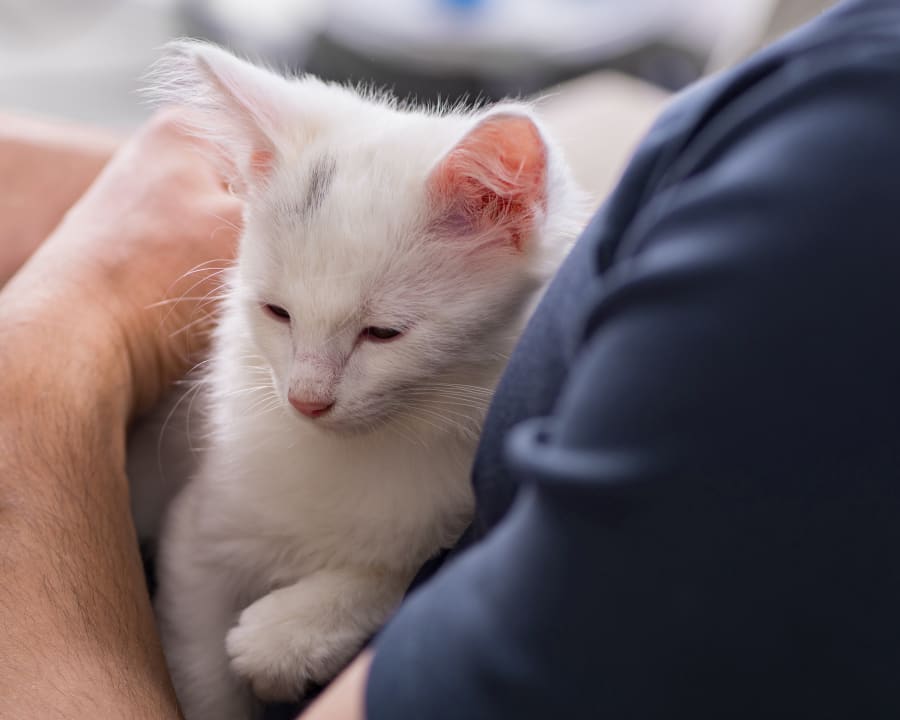Getting Your Pet Fixed
At Georgian Animal Hospital, our team understands that deciding to have your pet spayed or neutered can be overwhelming.
All surgeries performed under general anesthesia come with risks, but these common reproductive surgeries are considered safe for most dogs and cats.
Our veterinarians perform spays and neuters regularly and feel they help pets live healthier, more content lives. They also help reduce the population of dogs and cats in animal shelters and on the streets.
We take precautions to ensure a safe and successful surgery. These include pre-operative blood work and monitoring during recovery. We also offer pain management options so your pet is comfortable throughout the process.
We encourage you to speak with one of our veterinarians to learn more about the benefits and risks associated with spaying and neutering.

Neutering (Males)
Neutering is a surgical procedure where the testicles are removed from male pets, preventing them from fathering litters of kittens or puppies.
Cats: Neutering your cat can help to curb undesirable behaviours like spraying, roaming and aggression towards other cats.
Dogs: Neutering your dog may help reduce animal aggression, 'humping' and attempts at escaping your home or yard.
Spaying (Females)
Spaying removes a female pet's reproductive organs. This surgery prevents your pet from becoming pregnant.
Cats: Spaying your cat may help prevent them from escaping your home, roaming, yowling and urinating inappropriately.
Dogs: Having your female dog spayed ends their heat cycle and helps prevent womb infections and mammary tumours.
When to Spay or Neuter Your Pet
No one understands your pet's health better than a veterinarian. Although we provide general spay and neuter age guidelines below, it is always best to consult your veterinarian for advice.
Cats
Kittens can be spayed or neutered as young as six to eight weeks. Standard spay and neuter surgeries, however, are most often performed when the kitten is between five and six months old. That said, a healthy adult cat of any age can also be spayed or neutered.
Dogs
Traditionally, puppies have been spayed or neutered at around 6 months old. Some vets, however, have concluded that it is better to wait until the dog has reached sexual maturity before performing a spay or neuter. Speak to your veterinarian to determine the best time to have your dog spayed or neutered.
Benefits of Spaying or Neutering Pets
According to Humane Canada, between 20,000 - 28,000 dogs were taken in by Canadian humane societies and SPCAs in the three years between 2019 - 2021. They also report that those same agencies took in between 60,000 - 79,000 cats during this same period.
These numbers do not include animals taken in by the countless private rescue agencies across the country.
It's important to remember that spays and neuters are safe and routine surgeries. Reducing the number of unwanted pets in shelters and improving the health and behaviour of individual pets is part of responsible pet ownership.
Spaying & Neutering FAQs
For answers to more of your questions about spays and neuters. please read through the answers to these frequently asked questions from our clients.
- How long will it take for my pet to recover from surgery?
Spay and neuter procedures are typically day surgeries. This means pets can return home in the evening following their procedure.
Your pet's activity will need to be restricted for approximately 10 days, and a protective collar may need to be worn by your pet to prevent them from licking the incision.
Your vet may also request that you bring your pet in for a follow up appointment.
- Will my pet feel anything during the procedure?
No, your pet will be under general anesthesia and will not feel anything during the procedure.
- Will my pet gain weight after the procedure?
Your puppy or kitten will continue to grow to their full adult weight after the spay or neuter, and this naturally includes some weight gain.
However, your pet will not gain weight as a result of being spayed or neutered.
- How much will it cost to get my pet fixed?
The cost of your pet's spay or neuter depends on a variety of factors, including the size of your pet. overall state of health, and even where you live. To get an accurate estimate of the cost of your pet's spay or neuter, contact our Parry Sound animal hospital today.
- Will my pet need to stay at the hospital overnight?
No, spay and neuter procedures are day surgeries. This means you will drop your pet off in the morning at a pre-arranged time then pick them up once our veterinarians decide that your pet has sufficiently recovered and is ready to go home.
When you come to Georgian Animal Hospital to pick up your pet following surgery, we will be sure to provide you with detailed instructions for at-home care.
New Patients Welcome
Georgian Animal Hospital is accepting new patients! Our experienced vets are passionate about the health of all pets in Parry Sound, North Bay, Sudbury, Muskoka, and beyond. Get in touch today to book your pet's first appointment.
